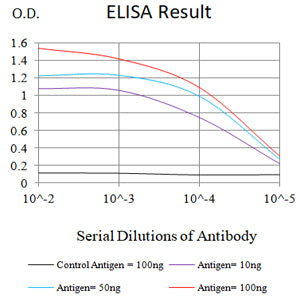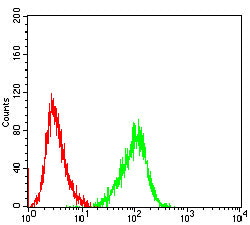

| WB | 咨询技术 | Human,Mouse,Rat |
| IF | 咨询技术 | Human,Mouse,Rat |
| IHC | 咨询技术 | Human,Mouse,Rat |
| ICC | 技术咨询 | Human,Mouse,Rat |
| FCM | 1/200 - 1/400 | Human,Mouse,Rat |
| Elisa | 1/10000 | Human,Mouse,Rat |
| Aliases | IK1; LYF1; LyF-1; CVID13; IKAROS; PPP1R92; PRO0758; ZNFN1A1; Hs.54452 |
| Entrez GeneID | 10320 |
| clone | 4B6A12 |
| WB Predicted band size | 57.5kDa |
| Host/Isotype | Mouse IgG2b |
| Antibody Type | Primary antibody |
| Storage | Store at 4°C short term. Aliquot and store at -20°C long term. Avoid freeze/thaw cycles. |
| Species Reactivity | Human |
| Immunogen | Purified recombinant fragment of human IKZF1 (AA: 401-520) expressed in E. Coli. |
| Formulation | Purified antibody in PBS with 0.05% sodium azide |
+ +
以下是关于IKZF1抗体的3篇代表性文献,涵盖其功能、临床意义及治疗应用:
---
1. **文献名称**:*Genetic alterations activating kinase and cytokine receptor signaling in high-risk acute lymphoblastic leukemia*
**作者**:Mullighan CG, et al.
**摘要**:该研究通过全基因组分析发现,IKZF1基因缺失或突变是儿童急性淋巴细胞白血病(ALL)预后不良的关键因素。研究利用特异性IKZF1抗体检测患者样本,证实IKZF1蛋白表达缺失与化疗耐药及复发风险显著相关,为靶向治疗提供了分子依据。
---
2. **文献名称**:*Deregulation of kinase signaling and lymphoid development in BCR-ABL1+ acute lymphoblastic leukemia*
**作者**:Roberts KG, et al.
**摘要**:文章探讨了BCR-ABL1融合基因与IKZF1缺失在ALL中的协同作用。通过免疫沉淀(使用IKZF1抗体)和RNA测序,揭示IKZF1缺失导致淋巴细胞分化阻滞和信号通路异常激活,提示其作为免疫治疗靶点的潜力。
---
3. **文献名称**:*Targeting IKZF1 in B-cell malignancies: From molecular mechanisms to therapeutic strategies*
**作者**:Churchman ML, et al.
**摘要**:综述总结了IKZF1在B细胞恶性肿瘤中的调控机制,强调其抗体在疾病分型及CAR-T细胞治疗中的应用。研究指出,基于IKZF1抗体的检测可优化患者分层,并指导开发靶向IKZF1缺失的联合疗法。
---
**备注**:上述文献多聚焦于IKZF1在白血病中的分子机制及临床检测,直接针对抗体的治疗应用较少,建议结合数据库(如PubMed)以“IKZF1 antibody therapeutic”等关键词进一步检索最新进展。
The IKZF1 gene encodes Ikaros, a zinc finger transcription factor critical for lymphocyte development and immune regulation. As a member of the IKAROS family, it regulates hematopoietic stem cell differentiation, particularly in B-cell and T-cell lineages, by modulating chromatin structure and gene expression. Antibodies targeting IKZF1 (anti-IKZF1) are primarily used in research and diagnostics to study its expression, localization, and functional roles in health and disease.
In clinical contexts, IKZF1 alterations (deletions/mutations) are linked to hematologic malignancies, notably B-cell acute lymphoblastic leukemia (B-ALL), where IKZF1 dysfunction correlates with high-risk subtypes and poor prognosis. Anti-IKZF1 antibodies aid in detecting these abnormalities via techniques like flow cytometry, immunohistochemistry, or Western blot. Additionally, autoantibodies against IKZF1 are rarely reported but may emerge in autoimmune conditions, though their clinical significance remains unclear.
Recent therapeutic advances leverage IKZF1-targeting agents, such as immunomodulatory drugs (e.g., lenalidomide) in multiple myeloma, which indirectly degrade Ikaros proteins. Research continues to explore IKZF1's role in immune evasion and its potential as a biomarker or therapeutic target. Anti-IKZF1 antibodies thus serve as vital tools in unraveling its complex biology and translational applications.
×